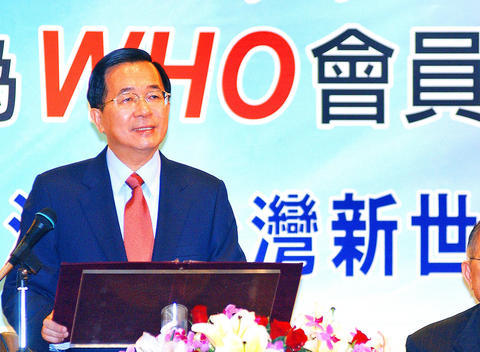President Chen Shui-bian (陳水扁) yesterday lashed out at the WHO Secretariat after it rejected Taiwan's bid to join the organization using the name "Taiwan."
Chen's remarks were the first formal response to the secretariat's rejection of Taiwan's membership bid on April 25. The president had sent a letter on April 11 to WHO Director-General Margaret Chan (陳馮富珍) asking that the country be allowed to join the health body.
The Central News Agency quoted WHO spokeswoman Christine McNab responding to Taiwan's request by saying: "The WHO's legal consultants, after studying UN resolutions and the WHO Charter, believe that Taiwan is not a sovereign state and is not eligible to apply for WHO membership. We have notified Taipei of this stance."

PHOTO: PATRICK LIN, AFP
Addressing a forum in Taipei on the issue, Chen reiterated that Taiwan is a sovereign state with the right to apply for WHO membership.
"It is the collective human right of the 23 million people of Taiwan, and [this right] should not be deprived by the WHO secretariat or its director-general," he said, also slamming China for what he described as its continuous suppression of Taiwan in the international community.
Citing the former East Germany as an example, Chen said whether Taiwan should be admitted into the WHO as a full member is an issue that should be determined by all WHO members.
"Taiwan has diplomatic ties with 23 WHO member countries, and one observer. Why did the WHO secretariat deny Taiwan's sovereignty and question the decision made by those 23 member countries?" Chen said.
East Germany was admitted to the WHO as a full member in 1968, after the then WHO chief asked for the issue to be included on the agenda of the World Health Assembly (WHA), the organization's highest decision-making body.
While urging the WHO to submit Taiwan's application to the WHA next month, Chen called on Taiwan's political parties and its people to unite and fight against "China's suppression" after being asked to comment on the Democratic Progressive Party's presidential primary.
"China's suppression of the collective human rights of the 23 million people of Taiwan is the important issue. In comparison, the DPP's presidential primary is nothing," he said.
Echoing Chen's remarks that the country has every right to apply to join the WHO as a full member, pro-independence panelists in a forum yesterday said that Taiwan should continue seeking the full WHO membership using the name "Taiwan."
"Applying for WHO membership under the name of Taiwan is an intelligent new policy and the correct way to go," said Chen Lung-chu (陳隆志), chairman of the New Century Foundation and director of the Taiwan United Nations Alliance.
After 10 years of failed attempts to become an observer at the WHA as a "health entity," Chen Lung-chu said Taiwan should pursue a new strategy, even though the bid failed again this year. He said the benefits of applying to be a full member are far greater than those attained on becoming a WHA observer.
"Applying for full membership under the name `Taiwan' highlights the country's sovereignty. It's time to adopt this strategy in consideration of Taiwan's fundamental and long-term interests," he said.
Wu Shuh-min (

Taiwan yesterday denied Chinese allegations that its military was behind a cyberattack on a technology company in Guangzhou, after city authorities issued warrants for 20 suspects. The Guangzhou Municipal Public Security Bureau earlier yesterday issued warrants for 20 people it identified as members of the Information, Communications and Electronic Force Command (ICEFCOM). The bureau alleged they were behind a May 20 cyberattack targeting the backend system of a self-service facility at the company. “ICEFCOM, under Taiwan’s ruling Democratic Progressive Party, directed the illegal attack,” the warrant says. The bureau placed a bounty of 10,000 yuan (US$1,392) on each of the 20 people named in

The High Court yesterday found a New Taipei City woman guilty of charges related to helping Beijing secure surrender agreements from military service members. Lee Huei-hsin (李慧馨) was sentenced to six years and eight months in prison for breaching the National Security Act (國家安全法), making illegal compacts with government employees and bribery, the court said. The verdict is final. Lee, the manager of a temple in the city’s Lujhou District (蘆洲), was accused of arranging for eight service members to make surrender pledges to the Chinese People’s Liberation Army in exchange for money, the court said. The pledges, which required them to provide identification

Nine retired generals from Taiwan, Japan and the US have been invited to participate in a tabletop exercise hosted by the Taipei School of Economics and Political Science Foundation tomorrow and Wednesday that simulates a potential Chinese invasion of Taiwan in 2030, the foundation said yesterday. The five retired Taiwanese generals would include retired admiral Lee Hsi-min (李喜明), joined by retired US Navy admiral Michael Mullen and former chief of staff of the Japan Self-Defense Forces general Shigeru Iwasaki, it said. The simulation aims to offer strategic insights into regional security and peace in the Taiwan Strait, it added. Foundation chair Huang Huang-hsiung

’DISTORTION’: Beijing’s assertion that the US agreed with its position on Taiwan is a recurring tactic it uses to falsely reinforce its sovereignty claims, MOFA said The Ministry of Foreign Affairs (MOFA) yesterday said Chinese state media deliberately distorted Taiwan’s sovereign status, following reports that US President Donald Trump agreed to uphold the “one China” policy in a phone call with Chinese President Xi Jinping (習近平). During the more than one-hour-long call, Xi urged Trump to retreat from trade measures that roiled the global economy and cautioned him against threatening steps on Taiwan, a Chinese government summary of the call said. China’s official Xinhua news agency quoted Xi as saying that the US should handle the Taiwan issue cautiously and avoid the two countries being drawn into dangerous